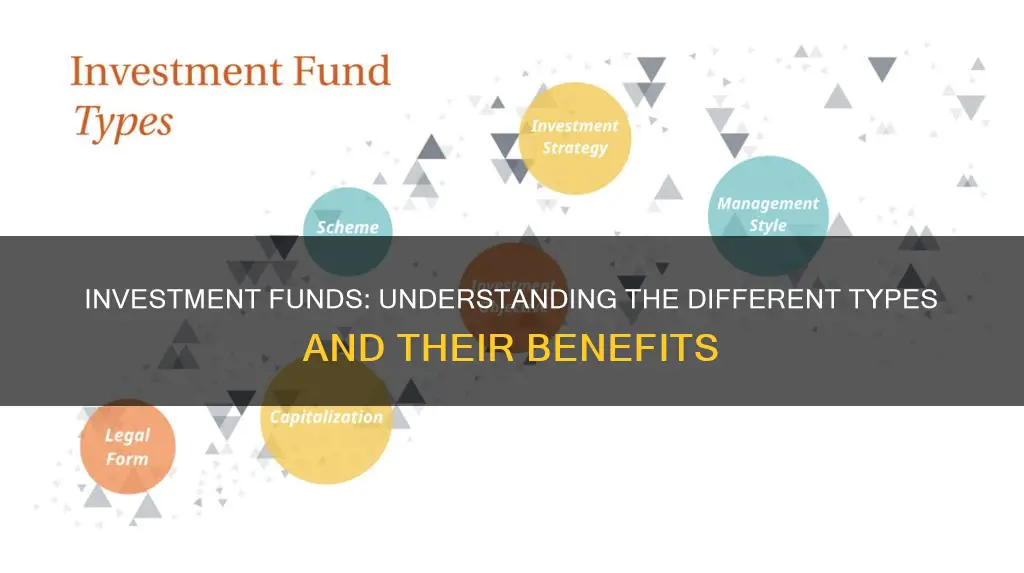
Investment funds are a supply of capital from multiple investors, used to collectively purchase securities. There are several types of investment funds, including mutual funds, exchange-traded funds (ETFs), money market funds, and hedge funds. These funds can be classified based on different criteria, such as their investment strategy, the type of assets they invest in, and the risk assumed. For example, funds that invest in the monetary market, such as credit transactions and government debt, are considered low-risk and highly liquid. On the other hand, equity funds, which primarily invest in stocks, offer higher potential returns but come with greater risk. Mixed funds combine fixed-income and equity instruments, with the level of risk depending on the percentage of each type of instrument. These funds are suitable for a wide range of investor profiles. Another type of fund is the guaranteed fund, which allows investors to recover their investment up to a certain date and sometimes offers additional returns.
| Characteristics | Values |
|---|---|
| Investment strategy | Monetary market funds, fixed-income funds, equity funds, mixed funds, absolute return funds, guaranteed funds, target date or passively managed funds |
| Risk | Low, high, or dependent on the fund's investment strategy |
| Liquidity | High or low |
| Management | Actively or passively managed |
| Trading | Open-end, closed-end, or non-standard |
| Fees | Management costs, transaction fees, 12b-1 fees, redemption fees, exchange fees, loads, expense ratios |
What You'll Learn

Mutual funds
There are several advantages to investing in mutual funds. Firstly, they offer diversification, allowing investors to access a wide range of asset classes, including domestic and international stocks, bonds, commodities, real estate, derivatives, and more. Mutual funds also provide professional management, with experienced fund managers conducting research and making investment decisions on behalf of investors. This can be particularly beneficial for those who do not have the time or expertise to manage their own investments. Additionally, mutual funds have minimal investment requirements, making them accessible to a wide range of investors.
Another benefit of mutual funds is that they can provide lower transaction costs compared to individual investors. Since mutual funds buy and sell large amounts of securities at a time, their transaction costs are typically lower than what an individual would pay. Mutual funds also offer a variety of investment strategies and styles, allowing investors to choose funds that align with their specific goals and risk tolerance.
However, there are also some drawbacks to consider. Mutual funds charge various fees and expenses, such as annual fees, expense ratios, sales charges, and management fees, which can reduce overall returns. Additionally, mutual funds may hold a significant portion of their portfolios in cash to maintain liquidity, which can result in a "cash drag" that earns no return. It's important for investors to carefully consider the fees and potential drawbacks before investing in mutual funds.
Hedge Funds: Private Investment Opportunities and Strategies
You may want to see also

Exchange-traded funds (ETFs)
ETFs are similar to closed-end funds in that they trade on exchanges and are priced and available for trading throughout the business day. ETFs are priced continuously throughout the trading day and therefore have price transparency. They are also more tax-efficient than mutual funds.
ETFs own financial assets such as stocks, bonds, currencies, debts, futures contracts, and/or commodities such as gold bars. Many ETFs provide some level of diversification compared to owning an individual stock. An ETF divides ownership of itself into shares that are held by shareholders. Shareholders indirectly own the assets of the fund and are entitled to a share of the profits, such as interest or dividends, and would be entitled to any residual value if the fund undergoes liquidation.
Most ETFs are professionally managed by SEC-registered investment advisers. Some ETFs are passively managed funds that seek to achieve the same return as a particular market index (often called index funds), while others are actively managed funds that buy or sell investments consistent with a stated investment objective.
Before investing in an ETF, you should read its summary prospectus and its full prospectus, which provide detailed information on the ETF’s investment objective, principal investment strategies, risks, costs, and historical performance (if any).
Best Investment Fund Options: Where to Invest Money?
You may want to see also

Money market funds
- Bankers' Acceptances (BA): Short-term debt guaranteed by a commercial bank
- Certificates of Deposit (CDs): Bank-issued savings certificates with short-term maturity
- Commercial paper: Unsecured short-term corporate debt
- Repurchase agreements (Repo): Short-term government securities
- U.S. Treasuries: Short-term government debt issues
The returns on these instruments depend on the applicable market interest rates, and therefore, the overall returns from the money market funds are also dependent on interest rates.
- Prime money funds: Invest in floating-rate debt and commercial paper of non-Treasury assets
- Government money funds: Invest at least 99.5% of their total assets in cash, government securities, and repurchase agreements that are fully collateralized by cash or government securities
- Tax-exempt money funds (or municipal money market funds): Offer earnings that are free from U.S. federal income tax and may also have an exemption from state income taxes
- Retail money funds: Accessible to individual investors due to their small minimums
Money Market Funds: Safe Investment or Risky Business?
You may want to see also

Hedge funds
There are several types of hedge funds, including global macro, equity, relative value, and activist hedge funds. Global macro hedge funds attempt to profit from broad market swings caused by economic or political events. Equity hedge funds invest in lucrative stocks while hedging against downturns in equity markets. Relative value hedge funds exploit temporary differences in the prices of related securities. Activist hedge funds invest in businesses and take actions to boost the stock price, such as demanding cost-cutting or restructuring.
JPMorgan Growth Advantage Fund Class R6: Smart Investment Move?
You may want to see also

Fixed-income funds
There are various types of fixed-income products, including:
- Treasury bills (short-term maturities of one year or less)
- Treasury notes (maturities between two and ten years)
- Treasury bonds (maturities of 20 or 30 years)
- Treasury Inflation-Protected Securities (TIPS) which protect investors from inflation
- Municipal bonds (issued and backed by a state, municipality, or county)
- Corporate bonds (with varying prices and interest rates depending on the company's financial stability and creditworthiness)
- Junk bonds or high-yield bonds (corporate issues with a higher risk of default)
- Certificates of deposit (CDs) (offered by financial institutions with maturities of less than five years)
Fixed-income mutual funds and exchange-traded funds (ETFs) are also available for investors who prefer to invest through funds. These funds offer professional management and diversification, holding hundreds or even thousands of bonds in a single fund.
When investing in fixed-income funds, it is important to consider the average maturity, credit quality, and sensitivity to interest rate changes. Additionally, investors should be aware of the risks associated with fixed-income investments, such as credit and default risk, interest rate risk, and inflationary risk.
SBI Mutual Fund: Invest Offline with Simple Steps
You may want to see also
Frequently asked questions
Mutual funds and non-redeemable investment funds. Mutual funds can be further classified into conventional mutual funds, exchange-traded mutual funds (ETFs), and alternative mutual funds.
Closed-end funds and flow-through limited partnerships.
Money market funds, equity funds, mixed funds, guaranteed funds, and hedge funds.
You should consider your investing goals, risk tolerance, management style, fees, and returns.
Funds can be classified based on the type of asset they invest in, such as fixed-income funds, money market funds, and equity funds. They can also be classified based on their investment strategy, level of risk, and potential return.







